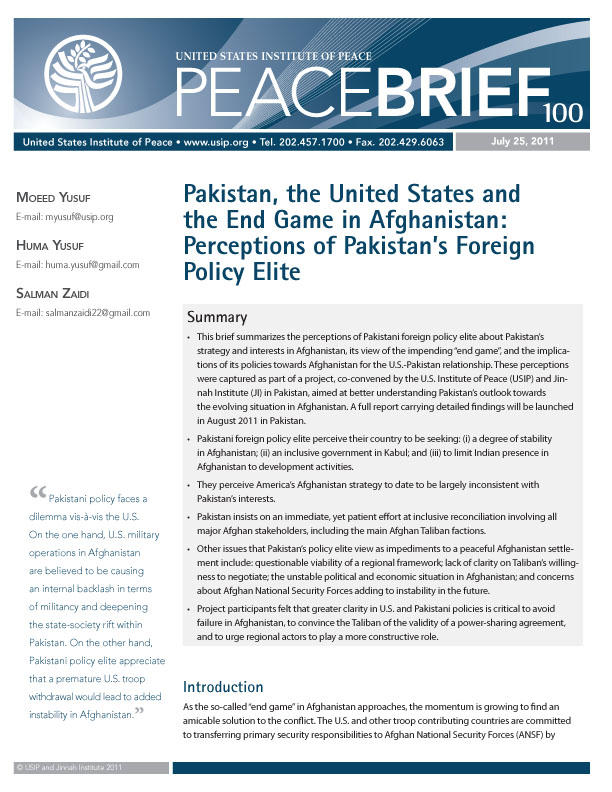Pakistan, the United States and the End Game in Afghanistan: Perceptions of Pakistan’s Foreign Policy Elite
This brief summarizes the perceptions of Pakistani foreign policy elite about Pakistan’s strategy and interests in Afghanistan, its view of the impending “end game”, and the implications of its policies towards Afghanistan for the U.S.-Pakistan relationship.

Summary
- This brief summarizes the perceptions of Pakistani foreign policy elite about Pakistan’s strategy and interests in Afghanistan, its view of the impending “end game”, and the implications of its policies towards Afghanistan for the U.S.-Pakistan relationship. These perceptions were captured as part of a project, co-convened by the U.S. Institute of Peace (USIP) and Jinnah Institute (JI) in Pakistan, aimed at better understanding Pakistan’s outlook towards the evolving situation in Afghanistan. A full report carrying detailed findings will be launched in August 2011 in Pakistan.
- Pakistani foreign policy elite perceive their country to be seeking: (i) a degree of stability in Afghanistan; (ii) an inclusive government in Kabul; and (iii) to limit Indian presence in Afghanistan to development activities.
- They perceive America’s Afghanistan strategy to date to be largely inconsistent with Pakistan’s interests.
- Pakistan insists on an immediate, yet patient effort at inclusive reconciliation involving all major Afghan stakeholders, including the main Afghan Taliban factions.
- Other issues that Pakistan’s policy elite view as impediments to a peaceful Afghanistan settlement include: questionable viability of a regional framework; lack of clarity on Taliban’s willingness to negotiate; the unstable political and economic situation in Afghanistan; and concerns about Afghan National Security Forces adding to instability in the future.
- Project participants felt that greater clarity in U.S. and Pakistani policies is critical to avoid failure in Afghanistan, to convince the Taliban of the validity of a power-sharing agreement, and to urge regional actors to play a more constructive role.
About This Brief
The authors of the report, respectively, are the South Asia adviser at the U.S. Institute of Peace, consultant author on the project at the Jinnah Institute, and security analyst at the Jinnah Institute.
The findings reported in this brief are based on a project coconvened by the United States Institute of Peace (USIP) and Jinnah Institute in Pakistan and funded by USIP. The project drew on the expertise of 54 Pakistani foreign policy elite and senior politicians. In March 2011, the policy elite were invited to roundtable discussions, and the politicians were interviewed between March and May 2011 for perspectives of major political parties. The findings capture the key perceptions of the policy elite but do not represent any consensus position. They do not necessarily reflect the views of the authors or the authors’ respective organizations.
This Report is the joint product of the United States Institute of Peace and the Jinnah Institute. All rights in the Report, in all jurisdictions worldwide, are reserved jointly to the Endowment of the United States Institute of Peace and the Jinnah Institute.



